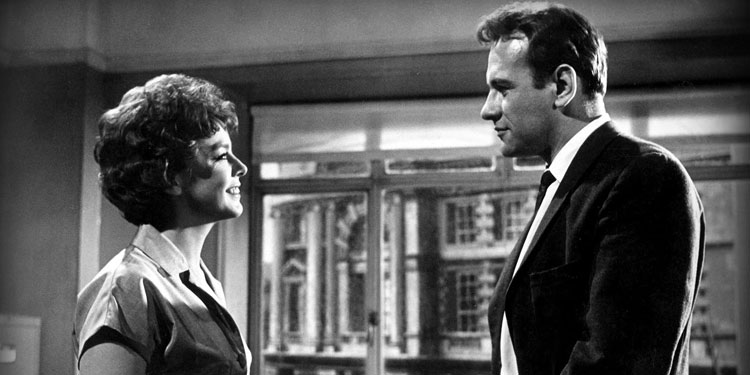
Director: Val Guest
Running Time: 100 mins
Certificate: 12
Release Date: November 17th 2014 (UK)

The BFI has been busy once more restoring a piece of cult cinema from Britain’s past, this time 1961’s slice of sci-fi, The Day The Earth Caught Fire, from Quatermass director Val Guest. Like the best of science fiction from that era, it’s a movie that’s not just about made-up nonsense, but takes on things such as the changes in sexual politics and most particularly fear of the nuclear bomb.
Like everyone else, Daily Express journalist Peter Stenning (Edward Judd) can’t help but notice that strange things are happening with the weather, such as an unexpected solar eclipse and weird, dense fog blanketing London. After getting off to a rocky start with civil servant Jeannie Craig (Janet Munro), they embark on a affair, and thanks to her Stenning gets a tip that the weather isn’t just an anomaly. The US and Russia simultaneously exploding nuclear bombs has knocked the planet off its axis and may also have sent it out of orbit and getting ever closer to the sun.
For those raised on a diet of big, flashy CGI spectacles, The Day The Earth Caught Fire will seem a very strange film. After all, it doesn’t even follow the people on the ground trying to stop the Earth from falling into the Sun, it’s a movie about the journalists who find out it’s happening, and who spend much of the film listening to radio and TV addresses from the people who are directly involved.
Nowadays it seems an odd strategy but it’s a surprisingly effective one, with the journalists being a great storytelling device who are presented as essentially normal people able to hold the authorities to account. Indeed it’s interesting that back then journalism could be presented as the paragon of virtue while the government is intrinsically untrustworthy and hideously paternalistic. It’s perhaps not surprising that Val Guest would present journalism this way as that was his background, but it’s certainly true that the public’s trust in newsmen has dropped massively in the past 50 years.
Instead of the race to save the world, the movie is more interested in things such as the danger of atomic weaponry and the government’s disdain for the public, who in the film’s world view the populous as an annoyance who are there to be patronised and who should just shut up and have nothing to say about whatever the self-proclaimed masters of the universe wish to do.
It’s also interestingly on the cusp of a change in sexual dynamics. Stenning is a rather old-fashioned misogynist pig, who’s divorced and having difficulty seeing his son (which is presented as intrinsically being the mother’s fault). However there’s also Jeannie, a woman with her own opinions and ideas, and has no wish to be subservient to men. While she works in the steno pool, it’s clear that’s solely because back then she wouldn’t have been allowed to rise higher up the ranks. She’s also sexually liberated in a way which, unlike many other films of the era, isn’t presented as her being a harlot or temptress. It’s an odd mix of being very forward thinking and oddly backwards, but it’s very thought provoking.
What it hasn’t quite caught up with the modern day on is with homosexuality, with a few jabs about the fact there are getting to be fewer ‘normals’ left. As with the sexual politics and the bomb, it’s part of the general worry about the fast changes taking place in society at the time.
The Day The Earth Caught Fire is also quite unusual for directly tackling nuclear weapons in sci-fi and not hiding the theme as a 50ft spider, or a mysterious glowing suitcase. Much 50s sci-fi was infused with fear of the atom bomb, but it rarely came out and said it, or directly criticised the use of them. However The Day The Earth Caught Fire looks it in the face (even if the idea the bombs would knock the Earth out of orbit is preposterous), particularly the arrogance of governments possessing and testing them despite the danger they know they represent, as well as the normal man of street who has to live with a threat that has nothing directly to do with them.
It’s a surprisingly entertaining film and thanks to the restoration it looks great on Blu-ray, including the famed yellow-tinted sections at the beginning and end. There are also some truly excellent special features, including a great new retrospective making of documentary full of fascinating insights. There are also some really good vintage documentaries, such as one about an atom bomb test, as well as a civil defence film about what to do in the event of a nuclear blast. The latter is brilliantly British and stiff upper lip about the whole thing, being more interested in the science and treating the whole thing as a terrible nuisance than the potential end of civilisation as we know that it could have been.
One thing I would take a slight issue with is the fact the BFI has included a quote from the Daily Express on the cover. As the movie is about a Daily Express journalist and largely set in the newspaper’s offices, any quote they give may be a little bit biased.
Overall Verdict: A great new release for this cult classic slice of British sci-fi, which still resonates over 50 years on, especially in the light of climate change.
Stills and Collections Gallery, Three nuclear films from the BFI National Archive: Operation Hurricane (Ronald Stark, 1952, 33 mins); The H-bomb (David Villiers, 1956, 22 mins); The Hole in the Ground (David Cobham, 1962, 30 mins), Think Bike road safety film with actor Edward Judd, Illustrated booklet, The Guardian Lecture: Val Guest and his wife, actress Yolande Dolan are interviewed by David Meeker
Reviewer: Tim Isaac





Leave a Reply (if comment does not appear immediately, it may have been held for moderation)